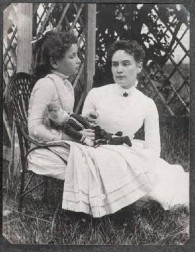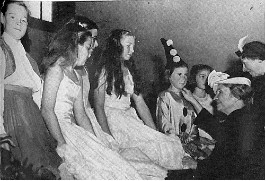 |
| Helen Keller and Anne Sullivan |
There are so many things in this world that one takes for granted. Whenever one goes on a walk, they hear the sounds of the birds quietly chirping, and see the cloudless, blue sky. These are sounds of peace and tranquility, sounds one doesn’t often pay attention to, but can’t envision living without. Imagine a world where all of these blessings are stripped away, so all one is left with is a black and soundless world. Helen Keller was one of the many individuals who endured a blind and deaf life. Keller was born in Tuscumbia, Alabama in 1880. She lived a jovial, carefree life until she was nineteen months old and was struck by an unknown but terrible disease. She miraculously recovered, but not without paying a price: Helen Keller would never see or hear again. As she grew, her often emotional and uncontrollable independence reined over her life; her vexation at not being able to communicate like the “normal people” around her reined over her life. She remained surly, inconsolable, and belligerent. By the time she was six, Perkins Institute for the Blind sent a teacher, Anne Sullivan, to help Keller. After attempting, and struggling, to help Keller communicate effectively, Sullivan introduced Keller to a water spigot. When she felt the cool water rushing over her hand. Sullivan, or “Teacher,” as Keller called her, quickly spelled into her hand the word “w-a-t-e-r.” Keller finally understood that everything in the world had a name, something that distinguished it from everything else. This changed her whole outlook on life, and as she grew, she became more determined to share her knowledge and discoveries with disadvantaged individuals like her. She traveled to many different countries lecturing and showcasing the belief that all people should be treated equally. During her lifetime, Keller participated in the funding and volunteer programs of many organizations around the world. Despite her many handicaps, Helen Keller’s selflessness, ambition, and persistence shaped her into an epic hero that many recognize and respect today.
Traveling the world, Helen Keller’s unfettered drive and dogged determination inspired others to see that all people, disabled or not, should be treated equally. Keller visited many countries, stating that reform was necessary. She traveled, “to Europe, North and South America, and Africa lecturing about the need to improve the lives of disabled people.” Keller’s personal life story inspired everyone who heard it, and her efforts – from writing autobiographical stories of hope and possibility, to giving speeches to other disabled and often impoverished people - made a difference in influencing the lives of many. Her natural easiness and sense of understanding brought hope and promise to the disadvantaged people with whom she communicated. She went to places where despair was prominent, seeking to make life better for the individuals fighting the blackness of lost hope, people who lived in literal – and metaphorical - darkness. “She visited hospitals and helped blind soldiers. She taught the blind to be courageous and to make their lives rich, productive, and beautiful for others and for themselves.”(Gale Resource Center) Having experienced firsthand the confusion and hopelessness that comes from being blind and deaf, Keller made it her goal to help other people see the light in their dark world. In places where grief and sadness are often the only emotions experienced, she was like their sun: something that warmed them and gave them a reason to live. Keller herself was living proof that life will always go on, no matter the setbacks, no matter the adversities. She used her travels to showcase her message: disabled people deserve the same courtesy and equitable treatment as able-bodied people. Keller’s hopeful nature and driven sense of independence made her a respected hero to all who had the privilege of knowing her.
 |
| Helen Keller as she visits children in a school |
In addition to the many lectures Helen Keller gave throughout the world, she was also an avid volunteer; her selfless devotion and donations were legendary to many organizations around the globe. She also began to focus on individual places that needed disabled treatment reform the most. Keller’s persistent belief that change was necessary drove her to seek the help of others around the world. “With insight, energy, and deep devotion to humanity, she lectured throughout the world, lobbied in Congress, and wrote thousands of letters asking for contributions to finance efforts to improve the welfare of the blind.” (Gale, Encyclopedia of World Biography) Keller believed that reform could only be achieved through the efforts of everyone, so she took it upon herself to spread the word and ask for donations to better the lives of the disabled. Her “insight, energy, and deep devotion to humanity” was fueled by her resolute belief that she, along with the rest of the world, could, in fact, change disadvantaged treatment for the better. Her driven nature helped lead the rally against unfair treatment among the disabled. Helen Keller also saw that many disabled people were losing their minds because of their physical and mental states. They often got thrown into asylums because many believed they were a danger to society. But Keller saw something different; she saw people who had lost their minds due to their chronically black and soundless world – something that could easily be fixed, when properly addressed and handled with a loving teacher. This was a core principle of Helen Keller. “Credited with prompting the organization of state commission for the blind, she helped put a stop to placing deaf and blind individuals into mental asylums.” (U*X*L Biographies) When Keller discovered that people were being thrown into asylums for their disabilities, she attempted to alleviate the worries of people who were convinced that disabled individuals were insane. She personally visited the prisoners in the asylums and told them her past, allowing them a glimpse at a better life – a life like hers. Endless devotion, a positive outlook, and a strong belief in second chances made Helen Keller legendary for all the work that she gave to make her message a reality.
Helen Keller once said, “Knowledge is love and light and vision.” Through her actions and speech, Keller proved that it doesn’t matter is one is blind or deaf; all that matters is that if one believes in oneself, one will always be able see light, hear the words of encouragement, and feel the love of the people that surround them. As Keller reflected on her life, she also said, “So long as the memory of certain beloved friends lives in my heart, I shall say that life is good.” She was touched by the many friendships she made during her travels, and this love kept her spirit alive and willful. She is an inspiration and a role model; her dedication is exemplary, and the love that touched everyone she spoke to showed just how much she really cared. Her many commendable traits such as passion, commitment, love, and persistence are those of a hero – those of Helen Keller.
Works Consulted
“Helen Keller.” U*X*L Biographies. Detroit; U*X*L, 2003. Gale Student Resources in Context. Web. 9 Dec. 2010.
Helen Keller Biography (American Foundation for the Blind) afb.org
Keller, Helen (Narrative Biography).* Encyclopedia of World Biography. Gale, 1998. General Reference Center Gold. Web. 13 Dec. 2010
Stuckey, Kenneth A. “Keller, Helen.” World Book Student. World Book, 2010. Web. 12 Dec. 2010
Page created on 1/14/2011 12:00:00 AM
Last edited 1/14/2011 12:00:00 AM
